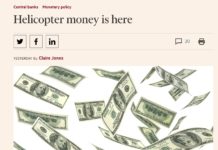Tag: Hong Kong
Hong Kong soaks up HKD 30 billion from interbank market to defend currency peg
Hong Kong Monetary Authority (HKMA) intervened twice in the foreign exchange market on Thursday (July 3) to soak up a total of HKD 29.6 billion from the city's interbank liquidity market, as HKD exchange rate fell toward the weak end of its official trading band.
‘Unusually low’ Hong Kong interest rate is a policy choice*
A careful study of Hong Kong's currency peg that explain why the current low-interest rate environment can be interpreted as a result of the Hong Kong Monetary Authority's policy choice.
How to benefit from others’ QE — Hong Kong Linked Exchange Rate’s lesson
What if I tell you, behind the boring news headline, there is actually a wonkish story about how the Hong Kong central bank took advantage of the monetary easing by the Fed in the last 12 year and created a new set of policy options that it can now use to actively mange the inflows created by the new round Fed easing under the Great Lockdown.
Helicopter Money is here in Hong Kong? Well…
“The money helicopter has arrived,” Claire Jones writes in her FT Alphaville post, citing Hong Kong Finance Secretary’s announcement of a handout of HKD...
Hong Kong Linked Exchange Rate & HKD-USD interest rate differential
HKD tends to be on the strong side (closer to HKD 7.75 per USD) when the interest rate differential is positive (HIBOR > LIBOR).
Interview with Paul Romer – On Charter Cities (and HK) and Growth Theory
"There is a big difference between saying you want to allow for city-scale reform zones that will encourage reform of government and innovation in government, and saying that you want to do away with government entirely and let a corporate entity run a private city," says Nobel winning economist Paul Romer.













